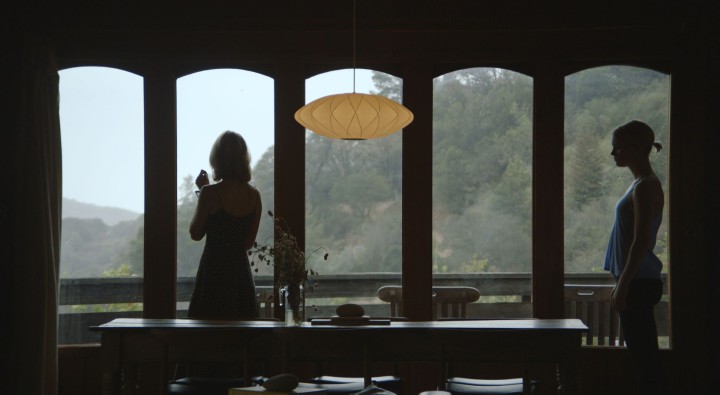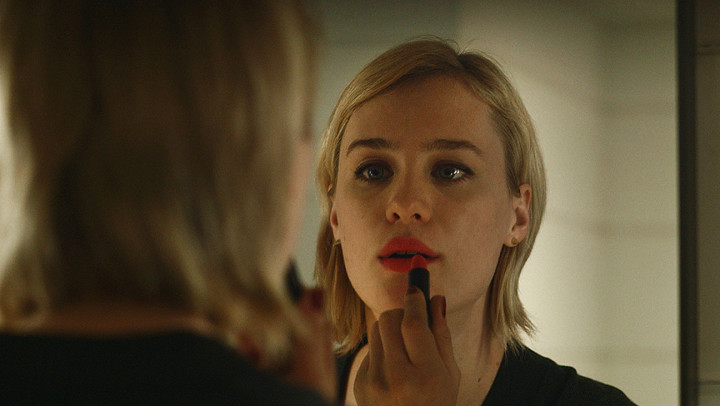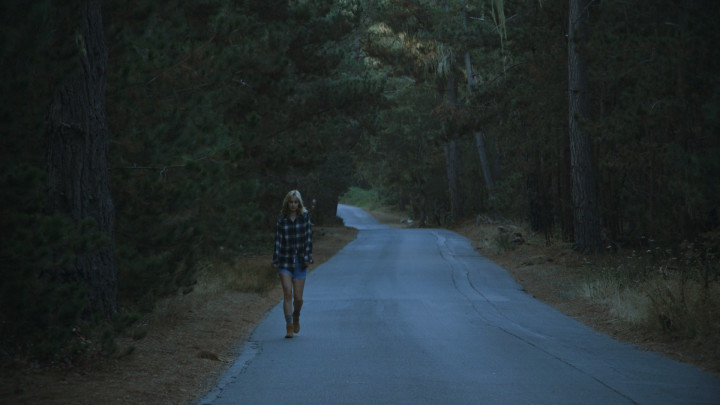Sophia Takal’s sophomore feature Always Shine is not so much a film as a diatribe on gender-specific identity and the difficulties of reconciling each individual woman’s representation of femininity in conflict with societal expectations of that role. It’s a profoundly important message, but one too often lost in Takal’s over-stylized directorial approach and descent into metafictional commentary. Outstanding performances from two charismatic female leads ground the production and elevate it beyond its one-note script, but the story falls short of serving the dialectical position it’s intended to espouse.
These two characters, Beth (Caitlin Fitzgerald) and Anna (Mackenzie Davis), are a pair of struggling young actresses locked in competition both professional and personal as they try to resuscitate their floundering friendship with a weekend in Big Sur. Fitzgerald and Davis expertly embody their characters, and while the script gives them plenty to work with, much of that material is misguided at best and hypocritical at worst. The film opens on an audition in which Beth, the more successful of the duo, is painfully objectified and dehumanized by two male filmmakers who guide her line readings from offscreen while clearly more concerned over her level of acquiescence to the extensive nudity her role in their low-budget horror movie would require. It’s an explicit and impactful mission statement on the part of the filmmakers, but as we see Beth and Anna consistently presented in skimpy clothing, frequently talking to, or about, men in which they’re sexually interested, and undercutting each other at every possible turn, the film’s intentions become less clearly defined.
In light of the recent uproar over a 2013 interview detailing Bernardo Bertolucci and Marlon Brando’s egregious misconduct with actress Maria Schneider while shooting Last Tango in Paris, Takal’s film has come along at a particularly opportune time to contribute to the crucial discussion of how women are treated (or far more accurately, mistreated) in the film industry. Then again, the only “bad” time to have any discussion so necessary and significant would be “later.” Unfortunately, Takal and screenwriter Lawrence Michael Levine undermine their entirely justified feminist agenda by couching it in a context too loosely founded on the broad strokes of its characters’ struggles, casting a marginally accusatory light on the very women at the story’s center even as it makes every man in their orbit look much, much worse.
If the men in Always Shine are pejoratively depicted as either overtly sleazy or dimwittedly exploitative, Beth and Anna are shown to be narcissistic egoists, self-absorbed and self-sabotaging stereotypes that seldom serve their own best interests. It does feel real in some ways, but a slightly less cynical representation of womanhood would have better served the film’s objective. A perfunctory plot twist, leaning heavily on DePalma’s Sisters, Lynch’s Mulholland Drive and Bergman’s Persona, makes a cursory attempt to remedy this state of affairs, but it does so with a significant story point that occurs entirely offscreen and is never satisfactorily resolved. Without giving too much away, this twist would have functioned more effectively in a film that had focused exclusively on its protagonists’ inner landscapes, or one that played out as a more straightforward thriller. As it stands Shine wants to have it both ways, leaving both story and characters underserved by an underwhelming third act.
As a man who self-identifies as a feminist, especially when it comes to film, I desperately wanted Always Shine to be the production that unequivocally excoriated the Hollywood establishment’s abysmal track record with women on both sides of the camera. And it very nearly was, at least until its third act jettisoned the film’s carefully drawn out character study in favor of a tired and poorly executed gimmick. Ida Lupino, luminary in the pantheon of feminist filmmakers, pointed out in later years that she had to constantly stroke male egos and downplay her own proficiency to maintain her directorial career from the late ‘40s to the end of the ‘60s. The fact that such stories still need to be told in 2016 makes me sad, and the fact that Shine fails to deliver any cathartic resolution to such a tale makes me sadder still. Not Rated.
Now Playing at Grail Moviehouse








Before you comment
The comments section is here to provide a platform for civil dialogue on the issues we face together as a local community. Xpress is committed to offering this platform for all voices, but when the tone of the discussion gets nasty or strays off topic, we believe many people choose not to participate. Xpress editors are determined to moderate comments to ensure a constructive interchange is maintained. All comments judged not to be in keeping with the spirit of civil discourse will be removed and repeat violators will be banned. See here for our terms of service. Thank you for being part of this effort to promote respectful discussion.